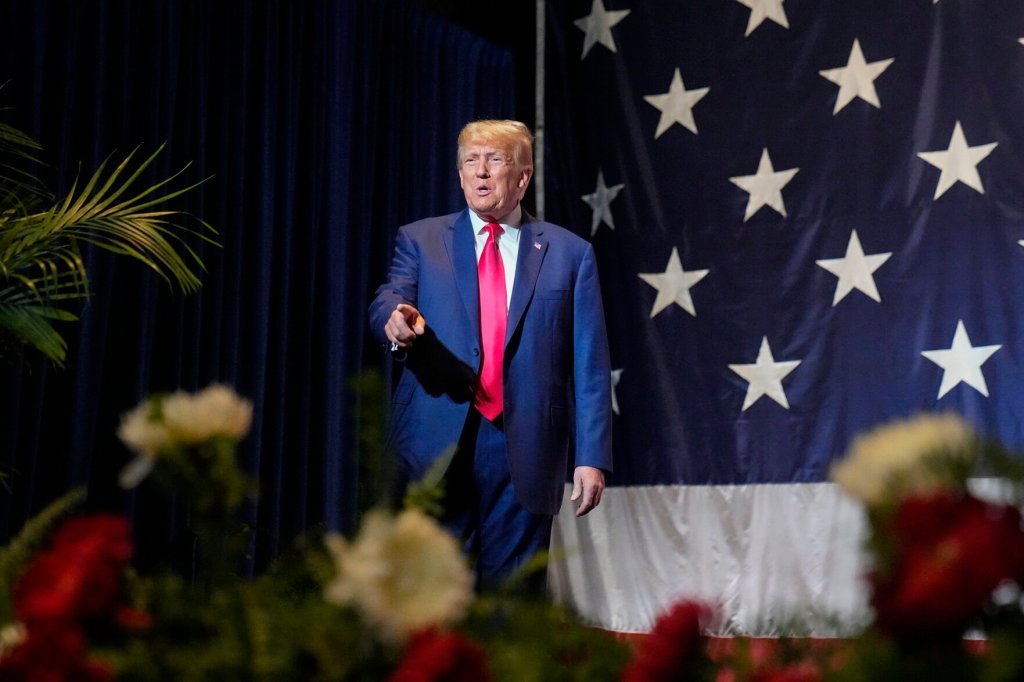Georgia Supreme Court shuts down Trump’s request to toss election probe
Published 9:39 am Tuesday, July 18, 2023

- RALLYING THE CROWD: Former President Donald Trump speaks at the Georgia Republican convention, Saturday, June 10, in Columbus, Georgia.
ATLANTA — Lawyers for former President Donald Trump went to the Georgia Supreme Court in a final attempt to throw out an investigation and any potential charges involving his alleged interference in the state’s 2020 general election.
The Supreme Court, however, wasted no time in rejecting the request the following business day.
Trump’s counsel — Jennifer Little, Drew Findling, and Marissa Goldberg, all of Atlanta-based firms— filed the petition July 13 asking that the Fulton County District Attorney’s office be recused from pursuing the case, and to quash the Special Purpose Grand Jury investigation and report which recommend charges on several persons involving election interference.
The request is similar to the Trump team’s petition filed in March in the Fulton County Superior Court. Trump attorneys at that time had also requested in that petition that a different judge hear his motion, but it has yet to be responded to by Fulton County Superior County Judge Robert McBurney. The petition notes that McBurney is also the same judge that supervised the SPGJ.
“Thus, stranded between the Supervising Judge’s protracted passivity and the District Attorney’s looming indictment, Petitioner has not meaningful option other than to seek this Court’s intervention,” the petition to the Georgia Supreme Court states.
Trump’s petition implied that the goal of the Fulton County probe’s “contortion of legal processes” is “irremediable injury” to Trump.
“The injuries include repetitional harm to the Petitioner as he seeks his Party’s nomination for the Presidency of the United States via a flagrant disregard for and violation of his fundamental constitutional rights,” the petition to the Georgia Supreme Court states.
The petition alleges that while the SPGJ was convening, Fulton County District Attorney Fani Willis headlined a fundraiser for the political opponent of one of the subjects being investigated.
Lawyers have persistent in questioning whether a SPGJ can use criminal investigative tools and that the evidence it obtained in its 2020 election investigation was privileged evidence and unlawfully obtained by the SPGJ.
The 36-page petition further asserts that McBurney and Fulton County District Attorney Fani Willis erred in interpretations of the function of a SPGJ, state and federal sovereign immunity, attorney-client privilege, and the authority to “target out-of-state targets of an investigation to provide evidence in support of potential indictments.”
The Georgia Supreme Court’s July 17 response rejecting Trump’s petition said it “has chosen to maintain its general status as an appellate court” and to exercise its original jurisdiction only in extremely rare situations where need has been shown.
The Court briefly responded to several of Trump’s claims in its 5-page response; Notably, however, the Court said it could not supersede McBurney’s lack of response to Trump’s March petition.
“Instead, he is asking this Court to step in and itself decide the motions currently pending in the superior court,” the state’s highest court said. “This is not the sort of relief that this Court affords, at least absent extraordinary circumstances that Petitioner has not shown are present here.”
Trump’s petition to the Georgia Supreme Court comes days after two grand juries were impaneled for the fourth term of Fulton County’s Superior Court, which runs from July 11 to Sept. 1 — the timeframe in which Willis said she plans to announce a charging decision in the election interference investigation.
Each panel is comprised of 23 jurors and three alternates; At least 16 jurors must be present for proceedings of which 12 votes are needed to move a case forward in each panel, one of which is likely to be handed the Trump case.
One of the grand juries will likely hear the evidence from the 26-person SPGJ that was impaneled by Willis in 2022 to investigate alleged election interference in the 2020 general election. That jury earlier this year recommended indictments following its 9-month investigation interviewing 75 witness.
The group looked into Trump’s phone calls with Georgia officials; more than a dozen Georgia Republicans who signed a certificate falsely declaring Trump as the winner; and the alleged copying of data and software from election equipment in Coffee County by a computer forensics team hired by Trump allies.
On a recorded phone call with Georgia Secretary of State Brad Raffensperger after the 2020 general election, Trump can be heard pressing Raffensperger to “find” 11,870 votes, which would have given him the victory in Georgia, surpassing President Joe Biden’s total.
Likely an implication of a more narrow window for an indictment decision, Willis sent a letter to Fulton County Superior Court Judge Ural Granville requesting that judges not schedule trials during the weeks beginning Monday, Aug. 7 and Aug. 14, saying during that time she has plans for 70% of her staff to work remotely.
Willis has also requested heightened law enforcement security in preparation of any potential indictments.
If Trump is indicted in Georgia, it will add to the list of his legal woes in other states.
In New York, Trump was issued a 34-count indictment for falsifying business records; He also has a nearly 40-count indictment in Florida with the U.S. Justice Department claiming to have found classified documents at the former president’s Florida estate.
Trump is also the subject of a federal investigation for alleged involvement with the Jan. 6, 2021 attack on the U.S. Capitol, and election-related investigations in other states.



